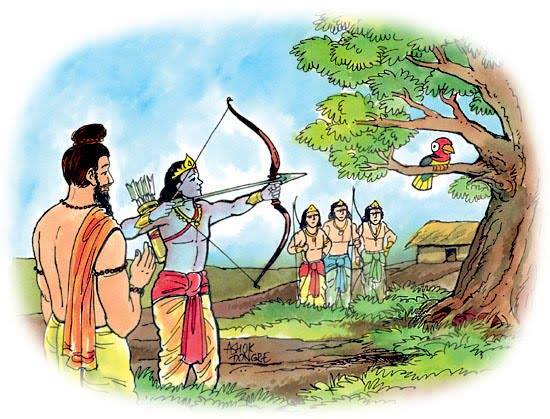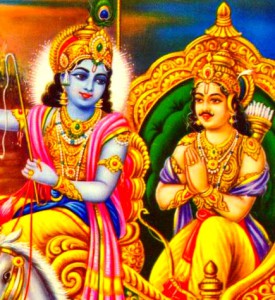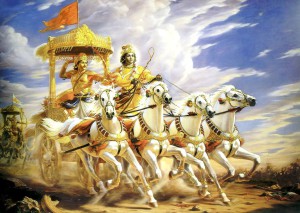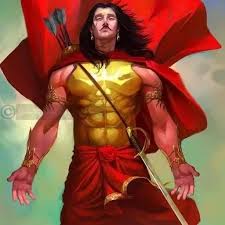The Story of Arjuna’s Focus
When Dronacharya was teaching archery to his students, he once asked them to shoot a bird on a tree by aiming at its eye. He called them one by one and, showing them the bird, asked what they saw.
Everyone except Arjuna said they saw the tree, the branches, the bird, etc., and so everyone missed the target.
Lord Krishna Himself declares in Bhagavad Gita verse 2.41:
vyavasaayaatmikaa buddhir / ekeha kuru-nandana bahu-shaakhaa hy anantaash ca / buddhayo ‘vyavasaayinaam
“Those who are on this path are resolute in purpose, and their aim is one. O beloved child of the Kurus, the intelligence of those who are irresolute is many-branched.”
Arjuna had been practicing archery day and night and was the best archer among Dronacharya’s students. When Arjuna’s turn came, Dronacharya inquired him as follows:
Dronacharya: “What do you see?”
Arjuna: “I see the eye of the bird.”
Dronacharya: “Do you see the tree?”
Arjuna:“No.”
Dronacharya: “Do you see the branch?”
Arjuna: “No.”
Dronacharya: “Do you see the bird?”
Arjuna: “No.”
Dronacharya: “Then what else do you see, Arjuna?”
Arjuna: “Nothing.”
Saying so, Arjuna released the arrow, and it hit the target straight.
Moral of the Story
The biggest problem we face is controlling the mind from wandering. For success in any job, focus and one-pointed, unwavering attention of the mind on the task is essential.
Reflection from Srimad Bhagavatam
In verse 11.9.13, the avadhuta brahmana explains how an arrow-maker was so focused on his task that he didn’t even notice the king passing by in a royal procession:
tadaivam aatmany avaruddha-citto na veda kincid bahir antaram vaa yatheshu-kaaro nrpatim vrajantam ishau gataatmaa na dadarsha paarshve
“Thus, when one’s consciousness is completely fixed on the Absolute Truth, the Supreme Personality of Godhead, one no longer sees duality, or internal and external reality. The example is given of the arrow maker who was so absorbed in making a straight arrow that he did not even see or notice the king himself, who was passing right next to him.”
The purport beautifully explains the arrow-maker’s focus:
“It is understood that when a king moves on a public street, he is heralded by kettledrums and other musical instruments and is accompanied by soldiers and other members of his retinue. Despite this royal extravaganza passing right by his workshop, the arrow-maker did not even notice because he was completely absorbed in his prescribed duty of making an arrow straight and sharp. One who is completely absorbed in loving devotional service to the Absolute Truth, Sri Krishna, no longer pays attention to material illusion.”
Lessons to be Learned
- Single-Minded Focus:
- Both Arjuna and the arrow-maker exemplify the power of single-minded focus. Arjuna’s ability to see only the eye of the bird and the arrow-maker’s absorption in his work highlight the importance of concentrating on the task at hand.
- Resolute Purpose:
- The Bhagavad Gita emphasizes that those on the path of spiritual progress have a resolute purpose. Similarly, success in any endeavor requires a clear and focused mind, free from distractions.
- Controlling the Mind:
- Controlling the mind and preventing it from wandering is crucial. A focused mind is essential not only for material success but also for spiritual advancement.
- Absorption in Duty:
- The arrow-maker’s story teaches us the importance of being absorbed in our duty. By immersing ourselves in our responsibilities, we can achieve excellence and remain undistracted by external events.
- Detachment from Material Illusions:
- By focusing on Krishna and engaging in devotional service, we can detach ourselves from material illusions and dualities, leading to a peaceful and fulfilling life.
Conclusion
The stories of Arjuna’s focus and the arrow-maker’s concentration illustrate the importance of single-minded dedication and the need to control the mind. Whether in material endeavors or spiritual practice, unwavering focus and absorption in one’s duties lead to success and fulfillment.
Prayer
Let us pray for the wisdom to cultivate focus and dedication in our lives:
“O Supreme Lord Krishna, guide us to develop single-minded focus and dedication in our endeavors. Help us to control our wandering minds and remain absorbed in our duties, both material and spiritual. May we always stay connected to You, free from material illusions.



